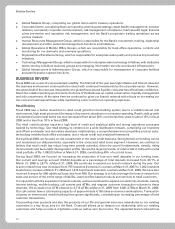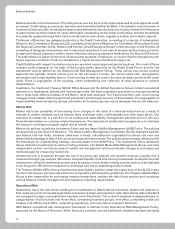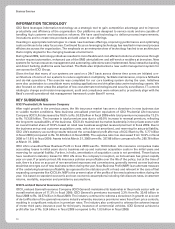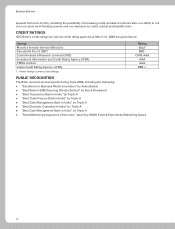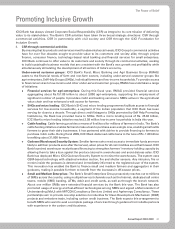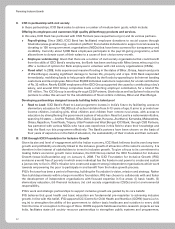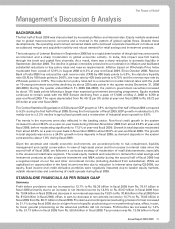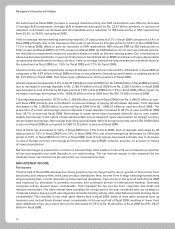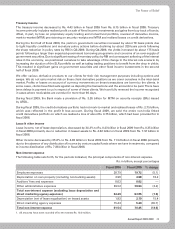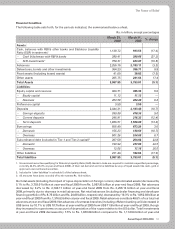ICICI Bank 2009 Annual Report Download - page 44
Download and view the complete annual report
Please find page 44 of the 2009 ICICI Bank annual report below. You can navigate through the pages in the report by either clicking on the pages listed below, or by using the keyword search tool below to find specific information within the annual report.
42
Promoting Inclusive Growth
II. CSR in partnership with civil society
In these partnerships, ICICI Bank seeks to achieve a number of medium-term goals, which include:
Offering its employees and customers high quality philanthropy products and services.
In this area, ICICI Bank has partnered with CSO Partners (ww.csopartners.org.in) and its various partners.
Payroll-giving: Since 2003, ICICI Bank has facilitated employee donations to social causes through
GiveIndia (www.giveindia.org), a donation platform that enables individuals to support social causes by
donating to 100 non-government organisations (NGOs) that have been screened for transparency and
credibility. Currently about 5,000 Bank employees participate in the payroll-giving programme, which
allows them to donate a part of their salary to a cause of their choice every month.
Employee volunteering: Given that there are a number of civil society organisations that could benefit
from the skills of ICICI Bank’s employees, the Bank has been working with Mitra (www.mitra.org.in) to
offer a number of options for Bank employees to volunteer with civil society organisations (CSOs).
Flood relief: In 2008, India experienced massive flooding in the states of Bihar, Orissa, Assam and parts
of West Bengal, causing significant damage to human life, property and crops. ICICI Bank responded
immediately, mobilising funds to help people affected by the floods by appealing to its Internet banking
customers and its employees. More than 55,000 individual customers responded, for a total contribution
of Rs. 32 million. Nearly 63,000 employees of the ICICI Group supported the cause by contributing a day’s
salary, and several ICICI Group companies made a matching employer contribution, for a total of Rs.
107 million. The ICICI Group is working through CSO Partners, GiveIndia as well as Sphere India and its
partners to utilise this amount for the rehabilitation of flood victims in Orissa, Bihar and West Bengal.
Developing partnerships designed towards building India’s talent pool
Read to Lead: ICICI Bank’s Read to Lead programme invests in India’s future by facilitating access to
elementary education for 100,000 out-of-school children from 6-13 years of age. It aims to provide low-
income children, including girls, tribal children and children from remote rural areas, with access to
education by strengthening the government system of education. Read to Lead is a nationwide initiative,
spanning 14 states — Andhra Pradesh, Bihar, Delhi, Gujarat, Haryana, Jharkhand, Karnataka, Maharashtra,
Orissa, Rajasthan, Tamil Nadu, Tripura, Uttar Pradesh and West Bengal. ICICI Bank, through CSO Partners,
has partnered with various NGOs who have vast experience in this field to share their knowledge and
help the Bank run this programme effectively. The Bank’s partners have been chosen on the basis of
their years of experience in the field of education, the sustainability of their models and their outreach.
III. CSR through ICICI Foundation for Inclusive Growth
Given its size and level of engagement with the Indian economy, ICICI Bank believes that its own long-term
growth and profitability are directly linked to the inclusive growth of all sectors of the nation’s economy. It is
therefore in the interest of stakeholders to invest in inclusive growth. To give a focus to its commitment to
making India’s economic growth more inclusive, the ICICI Group started the ICICI Foundation for Inclusive
Growth (www.icicifoundation.org) on January 4, 2008. The ICICI Foundation for Inclusive Growth (IFIG)
envisions a world free of poverty in which every individual has the freedom and power to create and sustain
a just society to live in. IFIG’s mission is to create and support strong independent organisations which work
towards empowering the poor to participate in and benefit from the Indian growth process.
IFIG’s first year has been a period of learning, building the Foundation’s vision, mission and strategy. Rather
than build departments within a large monolithic foundation, IFIG has chosen to collaborate with and foster
the development of independent organisations with focused expertise in five areas: (i) basic health, (ii)
elementary education, (iii) financial inclusion, (iv) civil society organisations (CSOs) and (v) environmental
responsibility.
IFIG’s work and strategic partnerships to support inclusive growth are guided by its core beliefs:
IFIG believes that good health and basic education are fundamental pre-requisites to achieving inclusive
growth. In line with this belief, IFIG supports ICICI Centre for Child Health and Nutrition (ICCHN) (www.icchn.
org.in) to strengthen the ability of the government to deliver basic healthcare and nutrition to every child
from the time of conception to the age of three. ICCHN supports field-based action-research projects across
India, facilitates state-civil society resource partnerships to strengthen public systems and programmes,


